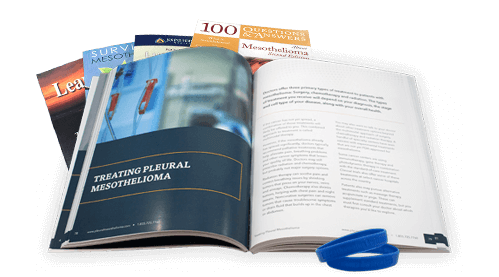Asbestos Industry in the US
The rise of the asbestos industry in the U.S. began in the late 1800s and reached its peak during World War II. Top asbestos suppliers were involved in the mining and manufacture of asbestos-containing products.
- Garlock Sealing Technologies
- Johns Manville
- Owens Corning/Fibreboard
- United States Gypsum
- W.R. Grace
These companies knew asbestos caused mesothelioma cancer and other painful, life-threatening diseases, but chose profits over the safety of their employees.
During the 1970s, asbestos lawsuits filed by workers with debilitating asbestos-related diseases began to pile up. By the 1980s, years of asbestos lawsuits began forcing asbestos companies into bankruptcy.
The bankruptcy process requires these companies to set up asbestos trust funds to pay for their negligence. Since their decline, construction, manufacturing and other industries that depended on asbestos products now mostly use nonasbestos products. Only a few industries continue to use asbestos such as the automotive, roofing and chloralkali industries.
List of Asbestos Companies
Many of the following companies are still operating but under different names. A few shut down, but most were able to avoid closure through bankruptcy protection.
- A.B.B. Lummus Global Inc.
- AC & S
- A.P. Green Industries
- Abex Corporation
- Amatex Corporation
- Armstrong World Industries
- Babcock & Wilcox
- Bell Asbestos Mines
- Bestwall Gypsum
- BorgWarner Inc.
- Burnham Holdings Inc.
- C.E. Thurston & Sons Inc.
- Celotex Corporation
- CertainTeed Corporation
- Cleaver-Brooks
- Combustion Engineering
- Congoleum Corporation
- Crown Cork and Seal
- Daimler Chrysler
- Dana Corporation
- EaglePicher Industries Inc.
- Ehret Magnesia
- E.J. Bartells Company
- Federal-Mogul Corporation
- Flexitallic Gasket Company
- Ford Motor Company
- Foseco
- Foster Wheeler
- GAF Corporation
- Garlock
- General Electric
- General Motors
- Gold Bond
- H.K. Porter Inc.
- Harbison-Walker Refractories Co.
- Honeywell Heating
- Ingersoll Rand
- Imerys
- J.T. Thorpe Inc.
- John Crane
- Johns Manville
- Johnson & Johnson
- Kaiser Aluminum
- Kelly-Moore Paint Co.
- Kentile Floors
- Leslie Controls Inc.
- Lincoln Electric
- M.H. Detrick Company
- Malleable Iron Range Company
- Mergenthaler
- Minnesota Mining & Manufacturing
- Mobil Oil Corporation
- National Gypsum
- Nicolet/Keasbey & Mattison
- North American Refractories
- Owens Corning Fiberglas
- Owens-Illinois
- Pacor Incorporated
- Pittsburgh Corning
- Plibrico Company
- Porter Hayden Company
- Rapid-American/Philip Carey Manufacturing
- Raybestos-Manhattan Raymark Industries
- Republic Powdered Metals
- Rock Wool Manufacturing Co.
- Rutland
- Shook & Fletcher
- Synkoloid Company
- The Flintkote Company
- Unarco
- Union Carbide
- United States Gypsum
- W.R. Grace
- Western MacArthur
- Westinghouse Electric

Top 5 Notorious Asbestos Companies in US
-

Johns Manville
Products: Asbestos roofing, insulation, cement, shingles and other construction materials
Occupations at Risk: Construction workers, roofers, insulators and shipyard workers
-

W.R. Grace
Products: Insulation and construction products sold under brand names Zonolite, Monokote and Perltex
Occupations at Risk: Insulators, construction workers, carpenters and HVAC workers
-

Owens Corning/Fibreboard
Products: Insulation, roofing and construction products sold under brand names Kaylo, One Cote and Ready Mix
Occupations at Risk: Insulators, roofers, construction workers and cement workers
-

United States Gypsum
Products: Plaster, cement, joint compound, tape and sheetrock
Occupations at Risk: Construction workers, carpenters, plasterers and cement workers
-

Garlock Sealing Technologies
Products: Gaskets, seals, packing and cloth
Occupations at Risk: Insulators, factory workers, plumbers and steel workers
Asbestos Cover-Up
U.S. companies were aware of the dangers of asbestos as early as the late 19th century. From the 1920s through the 1960s, medical reports confirmed the deadly health effects of asbestos exposure. Some of these reports were originally funded by asbestos companies. They ignored the scientific evidence and opted to cover it up.
The U.S. armed forces mandated the use of asbestos as a fireproofing material until the mid-1970s, when it adopted new regulations issued by the Occupational Safety and Health Administration. According to internal documents, the U.S. Navy began acknowledging the health risks of asbestos as early as the 1930s.
By the start of the 1970s, enough medical evidence existed to support legal action and legislation to regulate asbestos. Asbestos lawsuits took hold in the 1970s and began revealing the many ways asbestos companies disregarded the lives of their workers and their workers’ families by covering up the occupational health risks of asbestos exposure.
Asbestos Companies with Trust Funds & Filing a Claim
Many asbestos companies went bankrupt under the weight of asbestos litigation because they didn’t warn employees or provide adequate protection from asbestos exposure. Going bankrupt doesn’t mean they aren’t liable for causing the development of life-threatening diseases. Trust funds keep them accountable and provide much-needed compensation to asbestos victims.
Trust Funds
Asbestos manufacturers that cannot handle the financial strain of their asbestos liabilities are allowed to seek Chapter 11 bankruptcy protection. The bankruptcy courts and groups representing asbestos victims hold proceedings and negotiations to determine how much money should go into a trust fund for future claims.
The court system and asbestos victim advocacy groups hold negligent companies accountable by requiring them to establish trust funds through these bankruptcy proceedings. Filing for bankruptcy does not mean a company gets to escape its liability. Detailed bankruptcy proceedings work to ensure adequate funds are put into the trust.
Filing a Claim
Filing a trust fund claim is very similar to a filing a mesothelioma lawsuit. A lot of evidence is required and it involves detailed proceedings that vary by trust fund.
It is best to speak with an experienced mesothelioma lawyer about which trust funds you may be able to file a claim with. Filing claims with multiple trusts is common.
Do Companies Still Use Asbestos?
In the U.S., companies are not required to label asbestos in their products if it makes up less than 1% of the product.
While most companies in the U.S. do not actively manufacture asbestos products, some sell asbestos-containing construction materials and automotive products. For example, roofing materials and automobile brakes still contain asbestos.
Asbestos is regulated at the federal and state level but not banned in the U.S. Asbestos is banned in most other industrialized nations, including Canada, the United Kingdom, Australia and the European Union.



